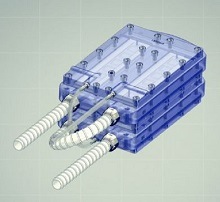
An implantable bioartificial kidney device (iBAK)—which promises to free kidney disease patients from dialysis machines and transplant waiting lists—has taken another step towards becoming a reality after being awarded a US$650,000 prize from KidneyX. The device’s creator, the Kidney Project, received this award following the first ever demonstration of its functional prototype.
The Kidney Project is a US-wide collaboration led by Shuvo Roy (Department of Bioengineering and Therapeutic Sciences, University of California San Francisco [UCSF], San Francisco, USA) and William Fissell (Vanderbilt University Medical Center, Nashville, USA). In the past few years, it has successfully tested the two essential components that make up its artificial kidney technology—a haemofilter, which removes waste products and toxins from blood, and a bioreactor, which replicates other kidney functions, like the balance of electrolytes in blood—in separate experiments.
To secure KidneyX’s Artificial Kidney Prize, the team married these two units in a scaled-down version of the artificial kidney that is roughly the size of a smartphone and evaluated its performance in a preclinical model following successful implantation. The units worked in tandem, powered by blood pressure alone, to provide continuous renal replacement therapy without the need for blood thinning or immunosuppressant drugs.
“The vision for the artificial kidney is to provide patients with complete mobility and better physiological outcomes than dialysis,” said Roy. “It promises a much higher quality of life for millions worldwide with kidney failure. Our team engineered the artificial kidney to sustainably support a culture of human kidney cells without provoking an immune response. Now that we have demonstrated the feasibility of combining the haemofilter and the bioreactor, we can focus on upscaling the technology for more rigorous preclinical testing, and ultimately, clinical trials.”
For the latest step forward in the development of this device, the Kidney Project team was awarded KidneyX’s Phase 1 Artificial Kidney Prize—becoming one of six winning teams selected from a field of innovators across Canada, Israel, Japan, The Netherlands, Portugal, Singapore, South Korea, the UK, and the USA. KidneyX is a public-private partnership between the US Department of Health and Human Services (HHS) and the American Society of Nephrology (ASN), which was founded to accelerate innovation in the prevention, diagnosis and treatment of kidney diseases.
The US Kidney Research Corporation, which has developed a wearable, dialysate-free artificial kidney that does not require water for filtration—drastically reducing the weight of the device—and David Cooper (University of Alabama at Birmingham, Birmingham, USA), who is working on genetically engineered pig kidneys that will reduce the likelihood of rejection while providing more viable donor kidneys, were among other recipients of the Artificial Kidney Prize.
Other successful innovations included MI-TRAM, a miniature, wireless toxin-removal system for implantable, wearable, portable or bedside artificial kidneys (imec USA Nanoelectronics Design Center), AKTIV, a wearable continuous-haemodialysis device allowing greater freedom of movement (University of Washington Center for Dialysis Innovation), and genetically engineered pig kidneys designed to increase the supply of transplantable organs by eliminating the antibody barrier to xenotransplantation (Makana Therapeutics).











